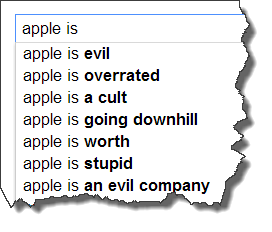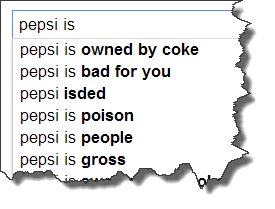
When someone needs to find information, the first thing they usually do is search the web by typing in the name of a service, product and/or brand. If you are a brand or an owner of a brand that has a presence on the web, it's good news for you. But lately there have been some concerns with Google's Autocomplete or Google suggest function.
What Is Google Autocomplete Function?

If you look at it closely, Google autocomplete has advantages for users:
- Saves time - the algorithm predicts search queries in real time. If you type in something it will complete the search query with several options. No need to type the entire word or phrase.
- Gives you options if you make a mistake - It gives you suggestions, just in case mistype or misspell a word. Google's algorithm will give you common spellings for popular search phrases.
- Show you past searches - If you are signed into your Google account and have the Web History enabled, it will show you what you searched for in the past, saving you time.
So What's The Issue With Google Autocomplete?

As you type, the Google algorithm will predict and complete search queries based on other people's search activities and web content that Google has indexed. If a brand is receiving more negative press than positive, autocomplete will often reflect that. Imagine having words like "scam," "lawsuits" or "poor quality" show up next to your brand name. That can adversely affect the searcher's perception of your brand even before they have a chance to try your product or service.
What Can You Do To Protect Your Brand?

There are three things that influence Google's Autocomplete :
- Search Volume - The number of people searching particular keywords related to your brand and your brand itself.
- Web Mentions - The number of times your brands or attributes are used across the web.
- Social Media Mentions - The number of times your brands or attributes are included in updates on sites like Twitter and Facebook.
Keeping the above knowledge in mind, here are three tips to help you manage your reputation online:
1. Be Proactive
You will need to make sure that your brand is well represented online. The quality of your web presence starts with you. It's more likely if someone talks about your brand first and says something negative, that review will show up in searches and we all know how people love clicking on negative feedback. The more clicks it gets, the better chance the review will be ranked even higher.
So the best thing to do is to build your presence by having your own website and social media accounts where people can interact and engage with your brand. Another way to be proactive is to create positive content. Press releases and blog posts work well, especially if you take the time to promote each via social networks and blogger outreach.
If you opt to put out news-worthy articles and maintain a blog, keep in mind that Google favors fresh results. Make sure to post fresh content on a regular basis. Consider posting new content at least twice a week. Also engage in promotions that help people talk about your brand in a positive light. Give out coupons or freebies if you can afford it. Getting more people to talk about you positively is a great way to manage your reputation.
2. Be Vigilant
This can be time consuming but very necessary for reputation management. You need to make sure to check Google search periodically. Monitor what people are saying about your brand. Monitor social media and blog posts and even news that mention your brand name. Web mentions have an impact on what shows up in search results so make sure you keep track. There are several tools available online that can make monitoring your brand more efficient.
Google offers a tool called Me on the Web. This tool makes it easier to monitor your identity online. It also helps you set up Google Alerts so you can receive notifications when you or your brand is mentioned on websites or in news stories. It automatically suggests search terms you may want to keep an eye on. Another useful tool for personal reputation management is Brand Yourself. - This tool will help you make sure search engines find and rank your most relevant results at the top, improving your brand's visibility.
3. Ask For Professional Help
If you've done all you can and still get a lot of negative words appearing next to your brand, then it's time to seek professional help. Many companies don't have enough resources to manage online reputation themselves so they hire experts to strategize and implement programs for them.
Six years ago, Google Auto complete was not a problem for companies and brands. They just had to monitor their page rankings. Today, there are so many things to watch out for when it comes to managing your reputation online. Bad reviews and negative comments can hurt your brand if you are not vigilant. If would like to see how Google Autocomplete is affecting your brand, search your name now. You might be surprised at what you discover.
If you liked this post, you might also enjoy The 15 Greatest Google Autocomplete Fails
